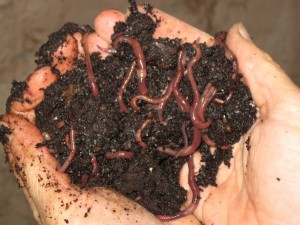Guides to Making Worm Compost
“I heard the earthworms produce a lot of greenhouse gases, is this true? Is worm farming really environmentally friendly?” ~ Jack Ousby
 This was a huge issue a few years back but we get people asking the same question time and again, especially when greenhouse gas emissions is such a hot topic at the moment.
This was a huge issue a few years back but we get people asking the same question time and again, especially when greenhouse gas emissions is such a hot topic at the moment.
As most of you may know, the reason why we are in our current growing concern of a warming climate is because of carbon dioxide CO2. It traps heat on our planet just like how a greenhouse traps heat. Other than CO2 there are also other gases which contribute to the greenhouse effect such as nitrous oxide (N2O) and Methane (CH4). Although these other gases exist in lower quantities to CO2, their effect on acting as a greenhouse gas exceeds CO2 by many times over.
Methane can be 23 times more potent than Carbon Dioxide as a greenhouse gas, while Nitrous Oxide is 298 times more powerful.
First of all we need to make clear that recycling food waste by any form of composting WILL produce some form of CO2 and other green house gases, but this is NORMAL and is part of the natural cycle.
So what is the difference between the CO2 which is causing global warming and the CO2 produced by composting?
Composting is a natural process which occurs in nature even without our meddling. Organic waste naturally breaks downs by itself and releases carbon compounds in the form of CO2.
However, in nature, this CO2 is also reabsorbed back by trees and plants to produce leaves and fruits. When these plants and fruits die, they are broken down and CO2 is again released into the atmosphere. This is the simplest form of the ‘Carbon Cycle’ where everything is balanced.
The CO2 which contributes to global warming is also part of a carbon cycle but a far slower one.
Most of this carbon is supposed to be trapped and stored deep underground as fossils and oil, which takes millions of years and a lot of crushing pressure to form. As these are dug up and burned in an exponential rate, the CO2 is being released and there is no quick route for it to be reabsorbed back into the ground. The increasing rate of deforestation does not help either.
Methane (CH4) is also part of carbon cycle, while nitrous oxide (N20) is part of the nitrogen cycle. Nitrous Oxide eventually turns into the harmless N2 gas.
Now back to worm farming.
How does worm farming even link up with producing greenhouse gases?
This topic revolves around two main scientists both specializing in the field of vermicomposting, Dr. Jim Frederickson of Open University, UK and Dr. Clive Edwards of Ohio State University.
Dr Jim Frederickson had been working the subject of Nitrous Oxide and Methane in vermicomposting since 2003, publishing a few papers on greenhouse gas emissions by vermicomposting. It wasn’t until in 2007 when some of the media caught on to his work that this news spread across the world.
His claim was that compared to windrow composting, vermicomposting produced more greenhouse gases in the form of Carbon Dioxide and Nitrous Oxide.
He also claimed that his conclusions were further supported by independent research done in Germany. This was a worrying conclusion for worm farmers as what they thought was environmental had suddenly turned into a potential world killing problem! Suddenly earthworms are taken into blame for the change of the climate, alongside with cow’s flatulence.
Luckily, Dr Clive Edwards stood up against these claims and examined the results in more detail. As one of the first pioneers of the flow-through continuous vermi-composting system and the author of over 140 papers and 6 books about earthworms, Dr Edwards was credible enough to counter Dr Frederickson’s work.
Dr. Edwards found that the experiments were designed poorly and that not all areas of controls were monitored, with one of the more important ones being moisture control. Moisture is really important as it changes variably in vermicomposting systems, and moisture levels will affect the diffusion of oxygen and nitrogen in and out of the compost.
In regards to the German research, Dr Edwards further states that Dr Jim Frederickson has misquoted the discoveries from the German researchers.
The German researchers did indeed find that their experiments showed an increase of nitrous oxide production, but these were from Earthworms in a garden soil setting within the laboratory without the full eco-system, and definitely not within a vermicomposting system.
Dr Edwards then brings out the results from 3 other independent researches which rejects Dr Frederickson’s claims.
In conclusion, it seems pretty clear that vermicomposting doesn’t create more greenhouse gases, and certainly does not cause more harm to the Earth’s environment. It does in fact help solve one of the bigger problems in modern society: organic waste.
Even scientists get it wrong sometimes, and it is important for us to research things in more detail about certain subjects and not rely on believing the media.
Allotment Growing UK has been granted exclusive & sole permission to republish the above article for the benefit of it’s visitors who are interested in composting with worms. Originally published in the excellent free worm composting newsletter – Worm Farming Secrets
If you would like further information, an excellent step-by-step “how to” guide, or have your own unique worm composting questions, be sure to visit Worm Farming Secrets now. With over 17,000 readers, Worm Farming Secrets is quite simply the leading worldwide authority on composting with worms. Click Here Now.
More on Worm Composting & Worm Farming
Wormeries – Worm Composters in the Allotment Shop
- Introduction to Making Worm Compost
- Worm Tea & Leachate Basics
- Worm Composting With Manure
- Worm Composting – Bedding Basics
- Worm Composting Eggs & Cocoons
- Aerating Your Worm Compost
- Small Scale Indoor Worm Composting
- Flies in Worm Compost
- Mould In A Can-O-Worms Worm Farm
- Worm Composting – The Basics Of Brewing & Using Worm Tea
- Is Worm Composting Environmentally Friendly?
- Storing Worm Leachate
- Problems With The Can-O-Worms Worm Composting System
- My Worm Composting Worms Are Dying
- Worm Composting In Winter & Cold Weather



